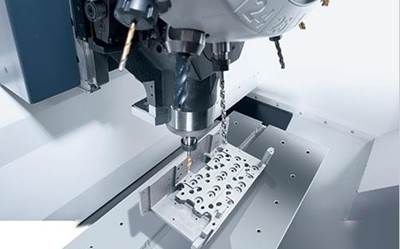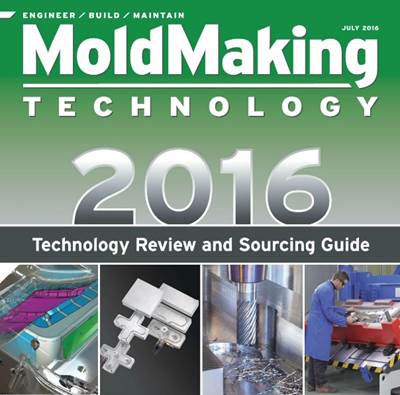Throwback Thursday: The Multi Approach
I consider myself quite the multitasker. Someone who is able to focus on multiple projects with equal efficiency. Well, most of the time anyway. But when it comes to mold manufacturing, multitasking can take the shop's operations to a whole new level ... every time. This look-back at our archives features an article that breaks down the barriers to multitasking and explains how it can optimize both production and profit in milling and high-speed cutting operations.
Read MoreVIDEO: Molds, Michigan and Mike Rowe?
I cannot tell a lie. I was beyond thrilled to finally see Mike Rowe acknowledge moldmaking in his quest to promote the value of manufacturing to this country.
Read MoreWEBINAR: Now You See It, Now You Don’t
Mold maintenance, and mold cleaning, is something that needs to be done, but who would say it should be celebrated instead of postponed?
Read More2016 Digital "Technology Review and Sourcing Guide" Available
If it's time to upgrade old equipment, try an alternative process, invest in a new strategy or just shop around, MoldMaking Technology’s annual Technology Review and Sourcing Guide is the perfect companion to your decision-making process.
Read MoreLargest Amerimold Show Floor to Date; See Technology Display
Amerimold, The Event for Mold Manufacturing, closed on June 16th, 2016, at the Suburban Collection Showplace in Novi, MI. The two-day tradeshow, technical conference and networking event featured more than 3,000 participants, representing every aspect of the plastic injection molding cycle. The Amerimold exhibit hall was the largest ever and included 200 exhibitors displaying products and services used for designing, building, injection molding and maintaining molds.
Read MoreLeadtime Leaders Made Their Presence Known at Amerimold
The moldmaking community is a family of sorts, and this becomes very evident every year at Amerimold when we celebrate our annual Leadtime Leader Awards Competition. Last week this was taken to another level when 2016 Winner Krieger Craftsmen registered a busload of people to attend Amerimold and make their presence known.
Read MoreCollaboration and Education
I visited with two companies at Amerimold last week in Novi, Michigan, that have committed to technology development R&D and collaboration to move innovation forward.
Read MoreAmerimold: Learning and Laughs
After two days of connecting buyers and sellers of products and services for designing, building, injecting and maintaining molds, Amerimold 2016 comes to a close on a very positive note.
Read MoreAmerimold: A Family Affair
Covering this industry for the past 19 years has shown me what a community--what a family--moldmaking is. This becomes very evident every year at Amerimold, but yesterday it was taken to another level.
Read MoreEliminating a Moldmaking Conundrum
A year ago we covered how cryogenic machining with through-tool liquid nitrogen makes production of longer-lasting molds efficient and affordable. If you are interested in diving deeper into this technology, there is a new online resource for you.
Read MoreMoldmaking: Where It's Been and Where It's Going
One mold builder shares his perspective on what has helped build the moldmaking industry and what will keep it going strong.
Read MoreFiguring Out Why Plastic Parts Fail
Why is the injection molding world so reliant on rules of thumb and patches to problems instead of the application of science, critical thinking and root cause solutions? Does anyone think they have truly optimized the design and production of their new plastic parts? You'll find out the answers to these questions at Amerimold.
Read More




















